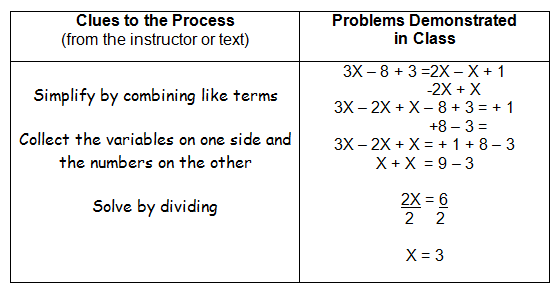Attitude is the most important quality affecting a student’s success in math courses. Using effective study techniques improves a student’s achievement.
Basic Tips for Success
- Attend class regularly and pay close attention because math is a “constant discipline” course.
- Make time to study math every day. Math is time intensive.
- Use a time management schedule to ensure that time for study is allotted daily.
- Read the syllabus carefully and keep it, class notes and handouts in a 3-ring notebook.
- Preview the assignment in the textbook before class and read over notes from the last class period.
- Take your textbook, notebook, pencils, highlighter and calculator to class everyday.
- Ask questions in class about homework, problems or material discussed in that day’s class.
During Class
- Arrive early and have all materials ready for use.
- Be prepared to take notes in class: Preview class materials and notes from the previous class. Use a 3-ring notebook. Label note page with the date, chapter, and section. Leave “white space” on the page to expand your notes after class. Use a 2-column notetaking system similar to the one below:
-
Copy board notes neatly and accurately into notebook along with all explanations. (Be sure to include words the instructor is using. Don’t just write down the math steps.)

- Pay attention to the questions other students ask and the answers given by the instructor.
- Ask questions in class to ensure understanding.
After Class
- Review and expand class notes within 24 hours. Fill in any gaps. Expand notes by adding any helpful material from the textbook; for example, in the left-hand column, add key terms that you will need to know.
- Read related textbook material and examples carefully to add to your knowledge and understanding—find the relationship between information in the text and class notes. Highlight important material in both.
- Make a set of 3 x 5 index cards to help learn key terms, formulas, etc. For example, put a formula on the front side of the card and a problem based on the formula on the back. Review the cards weekly.
- Work example problems, practice problems, and relevant exercises daily. Keep practice work neat, problems numbered and columns aligned. Being orderly will help accuracy.
- If you are unable to work practice problems after a reasonable length of time, get help from the instructor, the Math Center, a math tutor or the Study Skills Center.
Review for Math Quizzes and Exams
- “Constant review” is best!
- Know what material will be included on the test.
- Review notes and text to determine specific objectives that could be on the test.
- Locate and work examples and problems from previous assignments related to each objective.
- Work problems on the sample tests at the end of each chapter.
- Attend any review sessions offered by the instructor. Pay careful attention to all review problems.
- Avoid marathon study sessions! Start your review several days ahead of the test. Study for an hour and then take a break. Repeat daily until the test.
Taking a Math Test
- Arrive at the classroom 5 minutes early on the day of the test with pencils, pens, calculator, ruler, and any written materials that the instructor allows. Sit down, relax and do not review for the test or discuss the test while you are waiting!
- When the test is handed to you, look through the test to see what is on it and allot time to do all the problems on the test.
- “Dump” formulas and memorized facts onto the test page so you won’t forget them (write them down!) and unload your brain. Add to this list if you think of other material later. This eliminates worrying about forgetting the formulas and facts.
- Read all directions very carefully for each problem or section of the test. Note key words: calculate, solve, evaluate, etc.
- Do problems you know first — then go back through the test to do the more difficult problems. This has three benefits: you gain confidence; you may recall how to do other problems as you relax; as you work problems you know, you may find steps or material to help you with problems you skipped.
- Make drawings or diagrams to help solve problems — especially word problems.
- Always attempt to solve all problems because instructors often give partial credit.
- Always ask yourself if an answer is reasonable. If not, check addition, subtraction, multiplication and division of positive and negative numbers; check position of decimal points; check formulas where substitutions are made to ensure they are correct.
- Check over the test — then hand it in on time.
